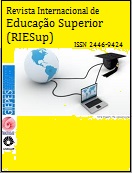Abstract
This paper aims to enhance the discussion about the internationalization of the higher education in Brazil, relating it in the context of capital crisis and its repercussion in the program of student mobility Ciências Sem Fronteiras (Science Without Borders). Presents a reflection about the direct intervention from multilateral organisms of financing in policies of higher education internationalization, when it’s mixed principles of knowledge transferring with economics and competitive reasons that will be materialized by means of “international cooperation” process, tendency that have been developed in whole world. The internationalization is not a new process in Brazil, but its settings has been changed during the last years by means of programs and policies induced by the Brazilian Government which ones the student mobility are emphasized. Based on this perspective, the Brazilian Government, in 2011, created the Science Without Borders Program (CsF), predicting the concession of 101 thousand scholarships in four years. This paper analyzes the concession of undergraduate scholarships by CsF on the term from 2012 to 2014, showing the destiny countries for the execution of this student mobility. The studies showed that policies inducing student mobility adopted by Brazil with the CsF has been contributing to consolidate the internationalization of the country and also that the Brazilian students are searching for countries considered as more developed and with the bests universities when producing knowledge.
A Revista Internacional de Educação Superior utiliza a licença do Creative Commons (CC), preservando assim, a integridade dos artigos em ambiente de acesso aberto.

